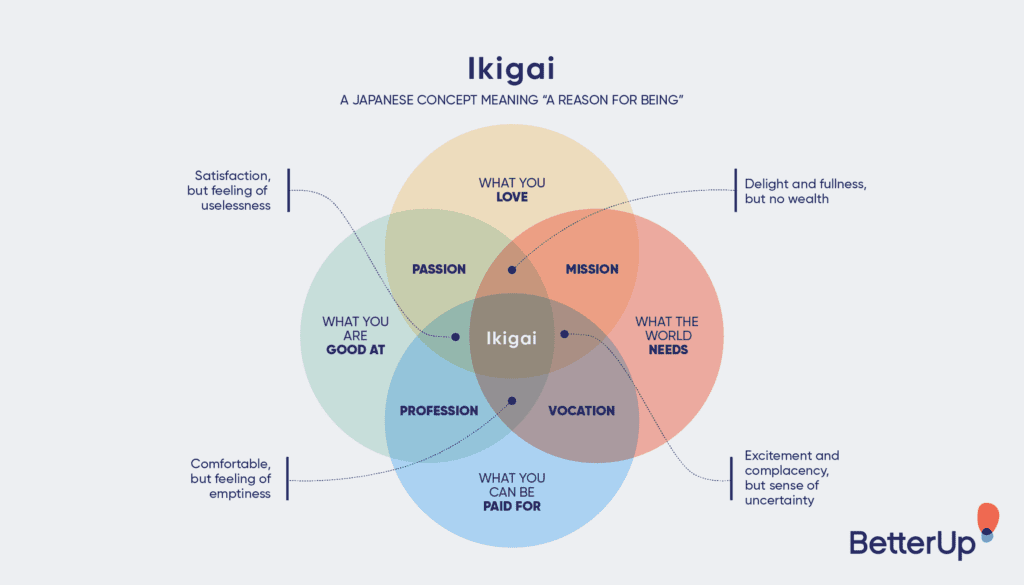
Finding purpose in life is something most of us want. But asking about your purpose can seem like too lofty an aspiration. Fortunately, there are models we can use to unravel our unique purposes, one of them being Ikigai. Ikigai is a Japanese word that represents the passions, talents, and professions that give meaning and allow us to contribute to the world. Learn more about finding your Ikigai and how you can use it to find purpose and meaning in life. (Estimated reading time: 12 minutes)
“The two most important days in your life are the day you are born and the day you find out why.”
— Mark Twain
“You must take your place in the Circle of Life.”
If you’re a 90s kid, you most likely recognize this line from the Disney movie, “The Lion King.” When watched through the eyes of a soul searcher, the film offers a wonderful allegory for the search for our life’s path.
In this scene, Rafiki, a wise baboon, is intuitively guided to where Simba is to wake him up with the truth.
“The question is ‘who are you?'” he asks the young cub.
“I thought I knew. Now I’m not so sure,” he responds despondently.
Rafiki reminds him that Mufasa, Simba’s father, lives in him, and so does his legacy. Soon after, a large storm cloud appears overhead, and the spirit of Mufasa speaks to Simba, saying that he’s forgotten who he is and must take his rightful place as the king of Pride Rock.
“Look inside yourself, Simba. You are more than what you have become”.
Simba contemplates his father’s message and eventually decides to return to Pride Rock to confront his evil uncle Scar who has taken over the land.
Like Simba, we often struggle to awaken to our true identities and reasons for being. But we also have an “inner Rafiki,” a wise voice reminding us that there is a purpose to our existence. But we can only hear it if we’re open and tuned to its guidance.
It’s easy to get side-tracked by distractions, unhealthy habits, and the influence of other people. In Simba’s case, his two well-intentioned friends, Timon and Pumbaa, convinced Simba to adopt a “Hakuna Matata” philosophy. This Swahili phrase translates to “there are no worries.” The English equivalent is “It’s all good!”
After the trauma of losing his father (and feeling responsible for it), a slow, carefree pace of life may be just what Simba needs to heal. However, the problem-free philosophy of living with no responsibilities or rules is not sustainable.
At some point, we all need to step up and enter the arena of life, knowing who we are and what we’re about. We must understand “our reason for being,” or Ikigai, as the Japanese call it. This emerges through self-discovery and a genuine curiosity to know what makes us tick and what we can do to serve a greater purpose.
Why do we need purpose in life?

Finding purpose in life is something most of us want. Each day, we aspire to become the person we are meant to be. But asking about your purpose can seem too lofty a goal, and trying to find the answer is like chasing a rainbow. Yet, purpose is attainable with the right attitude and methods.
Let’s start by understanding what exactly purpose is. Researcher William Damon defines it as “a stable and generalized intention to accomplish something that is at the same time meaningful to the self and consequential for the world beyond the self.”
It is why you get out of bed in the morning, and it’s dull and dreary, you’re tired, and you know the day ahead will be challenging or even boring.
These long-term, meaningful goals develop and evolve over our lives and become more crystallized as we try new endeavors, whether teaching, learning new skills, launching new projects, or heading organizations. Eventually, all the pieces come together to create a coherent picture.
Purpose is not the cookie-cutter idea of what constitutes a meaningful existence, like achieving a specific position in society, making X amount of money, getting married, or having kids. While there isn’t anything wrong with wanting these things, we must ask ourselves if it’s something we really want or whether it’s just accepted because everyone else is doing it.
Genuine fulfillment comes from developing your self-defined sense of purpose specific to your values, goals, and personality. Your purpose should be your own customized “why.” It’s your North Star that illuminates possibilities even in the darkest times.
Finding purpose can unlock happiness, satisfaction, and success in all areas of life. Because you feel energized from pursuing your bliss, you can bring more of yourself to your relationships and be a source of joy, inspiration, and support for others.
Finding purpose is more than motivational mumbo-jumbo. Neither is it merely a ‘nice-to-have’. It contributes to your wellbeing and mental health. Multiple studies have shown that those who live a life of meaning have better physical health, a lower risk of chronic disease, and tend to live longer. These benefits are amplified if our purposes allow us to connect with others.
More importantly, living purposefully guarantees that we leave this Earthly plane satisfied that our lives were well-lived. Spiritual writer Wayne Dyer urged us not to die with our music still in us. “Don’t die with your purpose unfulfilled. Don’t die as if your life has been wrong. Don’t let that happen to you.”
A brief overview of different philosophies of purpose

For centuries, philosophers debated the purpose of life. This philosophical query can be approached from several different angles, but what matters is your unique purpose.
Leaning into the purpose of life is a long game. If you get comfortable with the ambiguity of this existential question long enough, you’ll eventually stumble upon the most rewarding path.
In the ancient text, “The Bhagavad Gita,” we’re introduced to dharma, which roughly translates to “your sacred duty.” The epic quest of the warrior Arjuna and the sage Krishna to discover their dharma is a model we can use to find our path of purpose.
In the book “The Dharma in Difficult Times,” author Stephen Cope suggests that difficulties can also be a calling to your dharma. When faced with struggles, illness, and obstacles, we can peel back the layers of pain to reveal a deeper meaning. Cope suggests that other fruitful hunting grounds for purpose are our passions and the things that light us up.
But purpose can also save us in life-or-death situations. Viktor Frankl, who survived the horrors of the concentration camps in Nazi Germany, said that if they could create meaning from their experiences, they could survive.
He observed this in the concentration camps – those who had a reason to live had a higher chance of staying alive than those who didn’t. In those moments, their purpose was to survive, but what buttressed them was a bigger purpose for living.
Frankl alluded to the idea that purpose is intentional and something we can find in any circumstance. Nobody can take away your meaning-making proclivities.
Later in his career, he founded a school of thought called logotherapy, proposing that there is no one-size-fits-all approach to the meaning of life. He suggested that we can discover it through various kinds of experiences: deeds, immersion in a type of medium (art, love, beauty, etc.), and suffering.
Your purpose in life is as unique as a snowflake. Your specific set of skills, talents, and interests are the guideposts you can follow. Let’s look at a model for purpose that can help us discover these various aspects.
What Ikagai is, and how it can change our lives

The Japanese word Ikigai has gained popularity in recent years. But the concept had a long history in Japanese culture before it became a trend.
It was first mentioned in psychology by academic Meiko Kamiya in her 1966 book, “On the Meaning of Life.” It became prominent when people experienced its effectiveness in living a long and happy life.
What does Ikigai mean?
Ikigai can be described as having a sense of purpose in life. It’s our raison d’être — our passions, talents and professions that give meaning and allow us to contribute to the world.,
Ikigai compounds two Japanese words: iki (生き, meaning ‘life; alive’) and kai (甲斐, meaning ‘worth.’) The philosophy dates to 794 to 1185, during the Heian period.
The formal definition is “a motivating force; something or someone that gives a person a sense of purpose or a reason for living.” Your ikigai is your bliss; it inspires you and brings you joy.
In Japan, experiencing Ikigai is described as feelings of accomplishment and fulfillment that motivate people to pursue their passions.
While the word has been present in Japanese vernacular for centuries, it gained widespread attention in western culture when books like, “Ikigai: The Japanese Secret to a Long and Happy Life,” shed light on its principles and benefits.
Why pursue Ikigai?
Awakening to your ikigai has been proven to result in multiple benefits. The first and most apparent gain is greater happiness and fulfillment. When we focus our time, attention, and heart on accomplishing something we love, we’ll feel better and more energized.
To illustrate this, think about a time when you worked a job that felt boring and rote. Compare that with another job or hobby you get lost in for hours because you enjoy it. Each elicits different emotions and energy based on how aligned you feel with it.
Besides happier and more fulfilling lives and careers, knowing your ikigai can create a healthy work-life balance and stronger social and professional connections.
Another significant benefit that adherents tout is increased longevity. Japan ranks second in the world for life expectancy, with men expected to live 81 years and women to live 88 years. Diet and other factors certainly play a role, but many Japanese people credit their longevity to ikigai.
There are many centenarians in Okinawa, an island south of mainland Japan, and Ikigai plays a significant role in their culture.
According to National Geographic reporter Dan Buettner, elderly Okinawans prefer to continue to work in their favorite jobs for as long as they can instead of retiring.
More importantly, knowing your ikigai benefits not only you, but the whole world because you’re in a stronger position to contribute something beneficial.
As theologian Howard Thurman said, “Don’t ask yourself what the world needs. Ask yourself what makes you come alive, and go do that because the world needs people who have come alive.”
The four key components of Ikigai
A popular way to represent the concept of ikigai was created by Marc Winn in the Venn diagram below.

The image depicts distinct components: your passion, profession, mission, and vocation. Your ikigai lies at the intersection of these four components. The part where they overlap is your sweet spot, where you experience all the benefits of Ikigai.
Here is a more detailed description of each part of the illustration:
1. Mission: Do what the world needs
Your ikigai requires you to look outward to see what’s needed. You want to look for something through which you can create change and where you can make a unique contribution. It needs to connect to something greater and improve the world.
2. Passion: Do what you love
Doing something you’re passionate about and gets you excited and more driven to see projects through to completion, no matter what obstacles you face. You want to find something that’s engaging and makes you feel deeply connected.
3. Profession: Do what you are good at
Ikigai is also about using your talents and strengths. Whether you’re good at speaking at events, gardening, teaching, or solving mathematical problems, you can make it the centerpiece of your ikigai. It could be part of what you do for a living or expressed in a hobby or a place where you volunteer.
4. Vocation: Do what you can be paid for
This is the part of Ikigai that many people find most challenging to meet. We all aspire to get paid for using our talents to work on our passions, which can make the world a better place. Sometimes, we can gain satisfaction without getting paid, as in the case of volunteering or caring for our family.
How can we use Ikigai to find purpose and meaning?
Ikigai is inherent in all people. It’s unique to each individual and based on their beliefs and values. It is up to us to define our ikigai – we decide how simple or grandiose we’d like it to be.
These three steps will help you look within and figure out what makes life worth living for you on a personal level:
1. Ask yourself the right questions
Look at the Ikigai Venn diagram and ask questions to dig deeper into each circle (mission, passion, talent, and profession). Spot the commonalities in the overlapping areas, and you’ll eventually find your sweet spot.
Here are some initial questions to help you get started:
Mission: What does the world need right now?
Passion: What do I love to do?
Talent: What am I good at?
Profession: What can I get paid for?
2. Visualize and assess the potential
After self-reflection, hopefully, you’ve come up with a couple of options to explore. Envision what it would be like to devote your time and efforts to each of them. Visualize it in your mind and see how it feels.
The key is to look for the one that gets you most excited and where ideas pop effortlessly into your mind. Know that it’s normal for fearful and negative thoughts to come up, so do your best to keep those in check.
3. Brainstorm and learn more
The next step is brainstorming ideas. Consider researching, hiring a coach or an expert, taking classes, reading books, and listening to podcasts. As you broaden your knowledge, you may discover things you didn’t know before.
For instance, you may want to be a cardiologist, but after learning about how many years it takes to become one and how expensive tuition can be, you might decide to go for the next best option that is a better fit for the overall vision for your life.
4. Take action
Once you narrow down on an option, the next step is to take action and let your ikigai see the light of day. Like any other vision, you’ll need to develop a growth mindset, set goals, and create a plan and strategy to implement the steps.
As you do this, be open to feedback and tweak your strategy as you go. I like to have a support system of friends, coaches, and mentors to advise and support me through the ups and downs. Take stock of your progress every month or quarter and ask if you’re satisfied with the result.
For instance, if it’s been a few months since you started your Etsy shop to sell handcrafted items and the sales have not been as good as you expected, you may have to improve your marketing strategy or continue to create your pieces because of the emotional wealth.
Walt Disney once said that we should all strive to be so good at what we do that people can’t ignore us. I believe that the only way to reach this level of excellence is to do something you love and have a natural talent for. We need money to survive, but we need a purpose for our souls to thrive. No matter where you are, know that inspiration is always available.
All my best on your journey,
Seline

Question for you: Have you found your ikigai? Were you able to fulfill all four components? If not, what is getting in the way, and how can you change it?
Did you like this post? Sign up below, and I’ll send you more awesome posts like this every week.

OK, this was really interesting to read, I must say. I’ve never heard of this before, so it was really intriguing to find out everything covered here. You gave a lot of good information and some good ways to actually use it and apply it.
Thank you for sharing it all with us Seline!